Latest News
New Zealand knock Pakistan and India out to secure first T20 World Cup semi spot in eight years
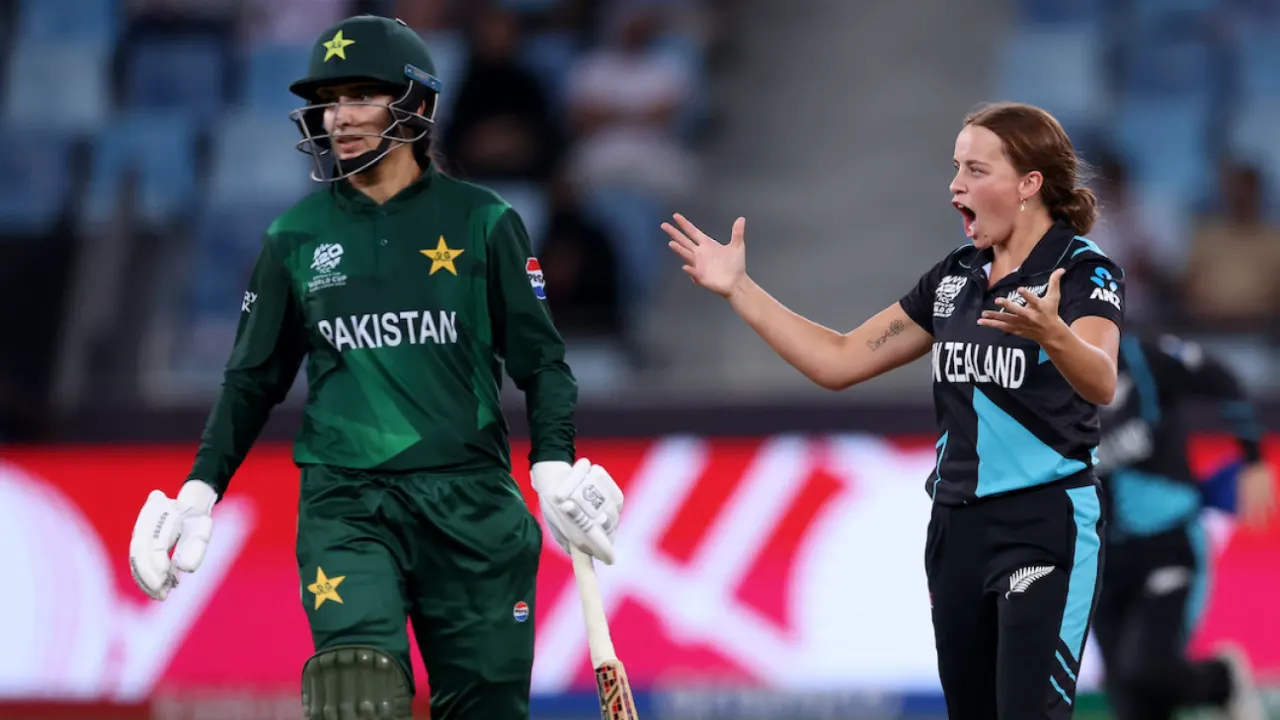
India’s hopes briefly arose. New Zealand could perhaps feel a sense of déjà vu. Pakistan themselves threatened to do the unthinkable. Only for all of it to come crashing at the end of it all.
New Zealand crushed Pakistan in their final group game to qualify for the semi-final of the Women’s T20 World Cup for the first time since 2016. Batting first, they could only finish on 110 for 6. India needed Pakistan to beat New Zealand for them to make the semi-final. Pakistan themselves needed to hunt down the score anywhere inside 11.3 overs to qualify for the last four at the expense of India and New Zealand. In a bid to do so, they were bowled out for 56, their lowest all-out total in T20 World Cups.
Nashra Sandhu led Pakistan’s charge with the ball, picking up three wickets to pull the plug on New Zealand’s scoring. But Amelia Kerr returned with three of her own, following Eden Carson’s strikes up top as New Zealand completed a remarkable comeback having come into the competition on the back of a record ten-match losing streak.
When Suzie Bates drove the second ball of the game down the ground to beat mid-off, it looked as if New Zealand’s decision to bat first was vindicated. An over later, both Georgia Plimmer and Bates managed to hit a four apiece off Fatima Sana before Plimmer bisected the gap at extra cover in the fourth over. By the end of five overs, New Zealand had hit five fours and looked good for more, despite a slightly higher number of dot balls faced.
Only when Omaima Sohail was brought on for the final over of the powerplay, did there come a sign of what was to follow.
Nida Dar’s first over, the fifth of the game, gave an indication of her fortunes for the day. Bates attempted a reverse lap on the second ball against Dar, only to deflect it to the wicketkeeper. But Muneeba Ali failed to hang on. That was the first of five dropped chances Pakistan missed off Dar’s bowling alone. In the sixth, Bates pulled Sohail straight to midwicket but Sandhu could not hold on. A ball before, Plimmer had survived a run-out chance.
Plimmer and Bates could not make those chances count. With New Zealand’s score on 41, the former skewed a top edge off Sandhu towards cover, where Sana fumbled before hanging on. In Sandhu’s next over, Bates hit one down long-on’s throat. Sohail had grassed a tough caught and bowled chance when Amelia Kerr was on nought but manage to have her caught at the deep midwicket ropes cheaply.
Boundaries were hard to come by. Sophie Devine tried using her feet to counter spin but to no avail. She was also given a life when she was on 13. Pakistan dropped five catches in the last three overs. Despite that, New Zealand could hit only seven fours – the last two coming off Brooke Halliday’s bat – and were restricted to a total that seemed very gettable at the halfway mark. Sandhu finished with 3 for 18 while Dar, Iqbal and Sohail also picked up a wicket apiece.
Pakistan knew they had to hunt down the 101-run target inside 12 overs for a semi-final place. Their intentions were clear when they sent Aliya Riaz up to open the batting alongside Muneeba. It was only the second time that Riaz had walked out to open in a T20I, the first time since 2014. Her stay lasted only three balls as she miscued offspinner Carson to cover. Muneeba began solidly, first skipping down to loft Carson straight back and then pulling Lea Tahuhu through deep backward square leg – aided by a misfield. But Tahuhu got one to seam in, past the inside edge, to make a mess of Muneeba’s stumps.
That was the start of a massive collapse from Pakistan. They lost five wickets inside the powerplay to be 28 for 5. A massively reworked batting order – that saw Dar bat at No. 7 – did not bear the desired result. Dar and Sana’s 24-run partnership for the sixth wicket was Pakistan’s best. But once their most experienced allrounder fell in the tenth over, Pakistan folded as quickly as New Zealand started. They lost their last five wickets for just four runs in 11.4 overs, the exact over mark by when they had to complete the chase to qualify.
Brief scores:
New Zealand Women 110 for 6 in 20 overs (Suzie Bates 28, Brooke Halliday 22; Sadia Iqbal 1-23, Nida Dar 1-26, Omaima Sohail 1-14, Nashra Sandhu 3-18) beat Pakistan Women 56 in 11.4 overs (Fatima Sana 21;Rosemary Mair 1-18, Amelia Kerr 3-14, Eden Carson 2-07, Lea Tahuhu 1-08, Fran Jonas 1-08) by 54 runs
[Cricinfo]
Latest News
UK Supreme Court backs ‘biological’ definition of woman
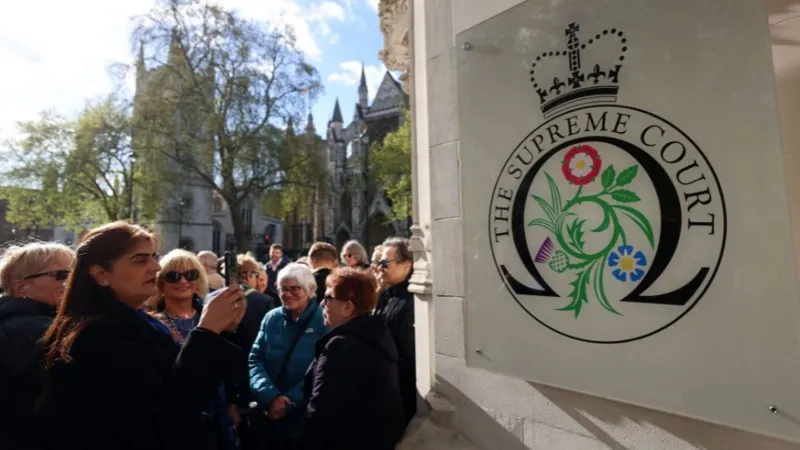
The UK Supreme Court has unanimously backed the biological definition of “woman” under the 2010 Equality Act.
It marks the culmination of a long-running legal battle which could have major implications for how sex-based rights apply across Scotland, England and Wales.
Judges sided with campaign group For Women Scotland, which brought a case against the Scottish government arguing that sex-based protections should only apply to people that are born female.
Judge Lord Hodge said the ruling should not be seen as a triumph of one side over the other, and stressed that the law still gives protection against discrimination to transgender people.
The Scottish government argued in court that transgender people with a gender recognition certificate (GRC) are entitled to the same sex-based protections as biological women.
The Supreme Court was asked to decide on the proper interpretation of the 2010 Equality Act, which applies across Britain.
Lord Hodge said the central question was how the words “woman” and “sex” are defined in the legislation.
He told the court: “The unanimous decision of this court is that the terms woman and sex in the Equality Act 2010 refer to a biological woman and biological sex.
“But we counsel against reading this judgement as a triumph of one or more groups in our society at the expense of another, it is not.”
He added that the legislation gives transgender people “protection, not only against discrimination through the protected characteristic of gender reassignment, but also against direct discrimination, indirect discrimination and harassment in substance in their acquired gender”.
Campaigners who brought the case against the Scottish government hugged each other and punched the air as they left the courtroom, with several of them in tears.
The Equality Act provides protection against discrimination on the basis of various characteristics, including “sex” and “gender reassignment”.
Judges at the Supreme Court in London were asked to rule on what that law means by “sex” – whether it means biological sex, or legal, “certificated” sex as defined by the 2004 Gender Recognition Act.
The Scottish government argued the 2004 legislation was clear that obtaining a GRC amounts to a change of sex “for all purposes”.
For Women Scotland argued for a “common sense” interpretation of the words man and woman, telling the court that sex is an “immutable biological state”.
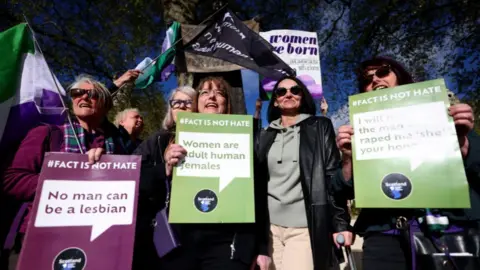
Outside the Supreme Court, For Women Scotland co-founder Susan Smith said: “Today the judges have said what we always believed to be the case, that women are protected by their biological sex.
“Sex is real and women can now feel safe that services and spaces designated for women are for women and we are enormously grateful to the Supreme Court for this ruling.”
A UK government spokesman said: “This ruling brings clarity and confidence, for women and service providers such as hospitals, refuges, and sports clubs.
“Single-sex spaces are protected in law and will always be protected by this government.”
Conservative leader Kemi Badenoch described the ruling as a “victory for all of the women who faced personal abuse or lost their jobs for stating the obvious”.
But Scottish Green MSP Maggie Chapman, a prominent campaigner for trans-rights, said: “This is a deeply concerning ruling for human rights and a huge blow to some of the most marginalised people in our society.
“It could remove important protections and will leave many trans people and their loved ones deeply anxious and worried about how their lives will be affected and about what will come next.”
The Scottish government has not yet commented on the ruling.
[BBC]
Latest News
We should start working collectively to rebuild the country -PM
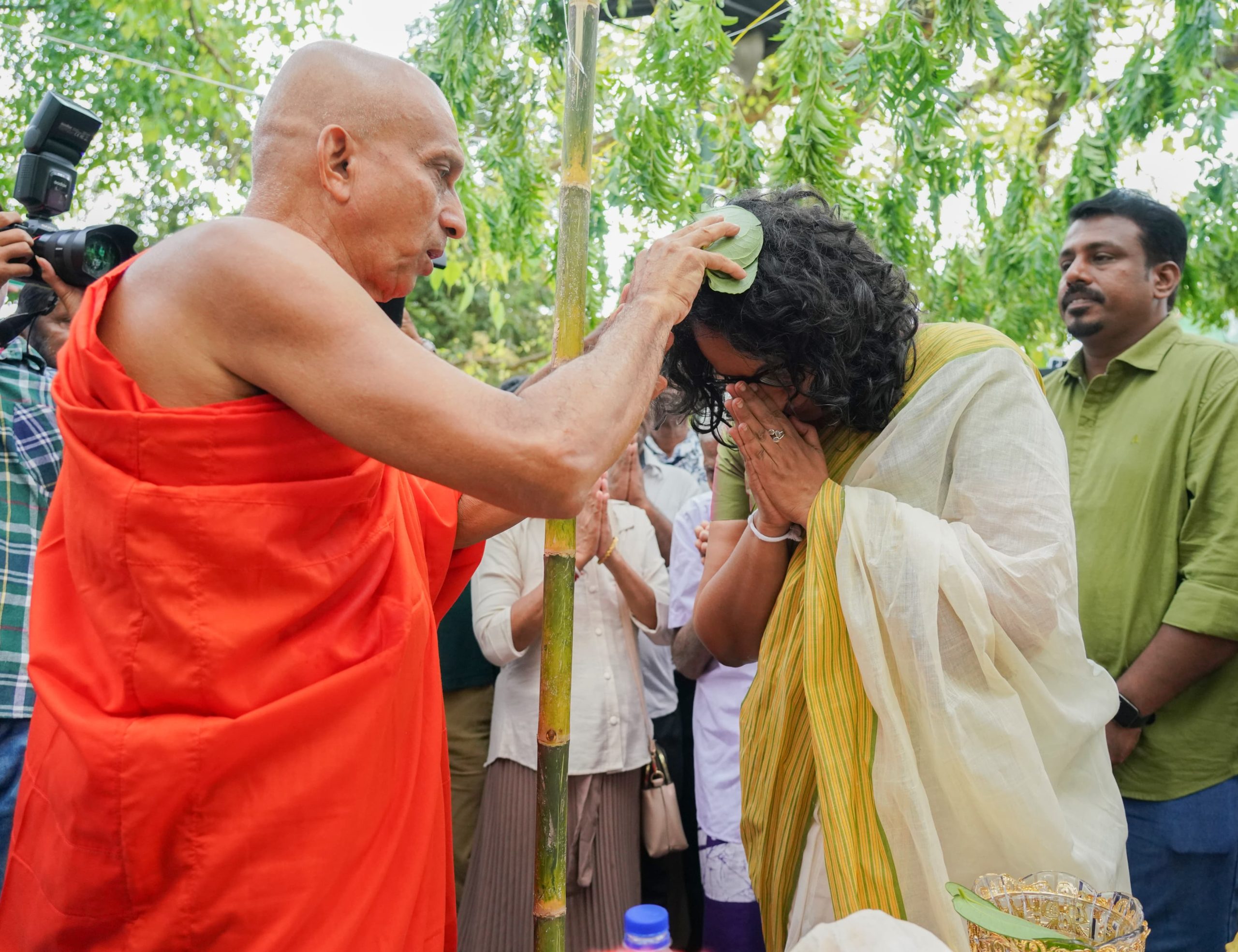
The oil anointing ceremony for the Sinhala and Tamil New Year was held on April 16 at the historic Rajamaha Viharaya in Kolonnawa, with the participation of Prime Minister Dr. Harini Amarasuriya.
Following the chanting of pirith, the oil anointing ritual was carried out at the auspicious time of 9:04 a.m., by the Chief Incumbent of the temple, Venerable Kolonnawa Dhammika Thero.
Speaking after the ceremony the Prime Minister said that:
“The Sinhala and Tamil New Year is one of the most important festivities in our country. It is a celebration with our families, reflecting our traditions and customs while strengthening the ties.
This festival leads the path for renewing unity, love, and bonds stronger. These values enrich a country. Development of a country is not limited by one-dimensional; a true development includes spirituality, relationships, and connections. The reason why we uphold these customs in such ceremonies is to remind ourselves of the significance and to pass on their value to future generations.
Therefore, today marks a significant day. Throughout this week, we came together and engaged in various activities. Followed by, the next event will mark the leaving for employment at the auspicious time and we should start working collectively to rebuild the country.
I wish everyone a New Year that is prosperous, peaceful, joyful, full of strengthened relationships, and most importantly, safe for all.”
The ceremony was graced by the presence of the Maha Sangha, and attended by the Deputy Minister of Youth Affairs Eranga Gunasekara, Divisional Secretary to Kolonnawa Priyanath Perera, Municipal Secretary Nelum Kumari Gamage, and the residents of the area.
[Prime Minister’s Media Division]
Latest News
India’s Gandhis charged in money laundering case amid opposition outcry
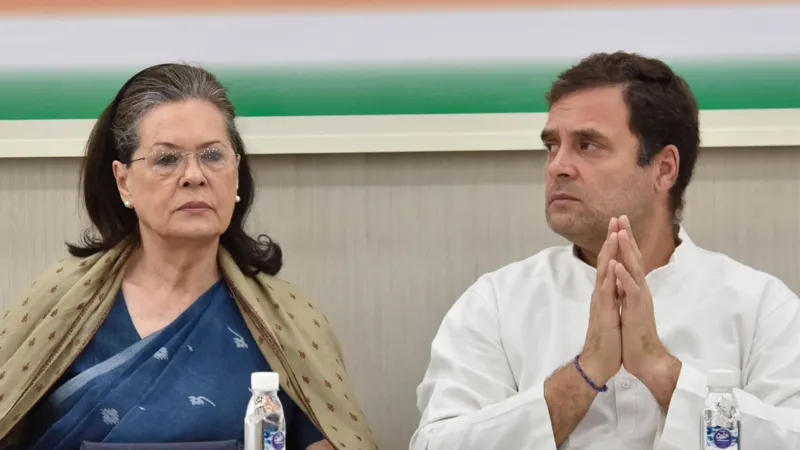
India’s opposition Congress party has said it will organise nationwide protests on Wednesday after the country’s financial crimes agency charged senior leaders Sonia and Rahul Gandhi and others with money laundering.
The Enforcement Directorate (ED) presented its findings in a Delhi court on Tuesday, accusing the Gandhis of forming a shell company to illegally acquire assets of the National Herald newspaper worth more than 20bn rupees ($233mn; £176mn).
Congress spokesperson Jairam Ramesh called the charges “politics of vendetta and intimidation” by the government.
The Gandhis who have previously denied any wrongdoing have not commented on the charges.
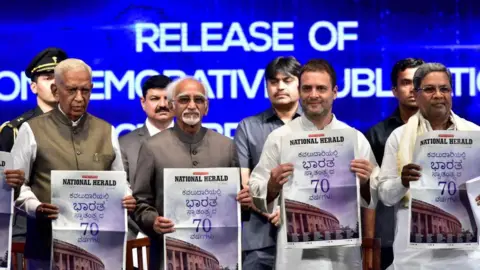
The investigation also names other members of the Congress party, including its overseas chief Sam Pitroda, according to news agency ANI.
The Enforcement Directorate (ED) began investigating the case in 2021 after a private complaint filed by Subramanian Swamy, a member of the governing Bharatiya Janata Party (BJP).
Swamy alleged that the Gandhis used party funds to take over Associated Journals Limited (AJL), which published the now-defunct National Herald newspaper, and illegally acquired properties worth millions through AJL.
The Congress maintains that it bailed out the publisher due to its historical legacy and had lent more than 900m rupees to AJL over the years.
In 2010, AJL became debt-free by swapping its debt for equity and assigning the shares to a newly created company called Young Indian, which the party says is a “not-for-profit company” with no dividends paid to its shareholders and directors.
Sonia and Rahul Gandhi are among Young Indian’s directors and they each own 38% of the company. The remaining 24% is owned by Congress leaders, including Motilal Vora and Sam Pitroda.
Last week, the Enforcement Directorate said Young Indian had acquired AJL properties worth 20bn rupees for just 5m, significantly undervaluing their worth.
It also served several notices to seize assets worth 6.6bn rupees across several Indian cities – including Delhi and Mumbai – which are connected to Young Indian.
The case is scheduled to come up for hearing on 25 April.
In recent years, the opposition has repeatedly accused the Narendra Modi government of weaponising the Enforcement Directorate against its political opponents.
According to data compiled by Reuters in 2024, the agency has summoned, questioned or raided around 150 opposition politicians since Modi came to power in 2014.
Last year, the ED arrested former Delhi chief minister Arvind Kejriwal in connection with an alleged liquor scam just a month before key general elections. He spent five months in jail before being freed on bail.
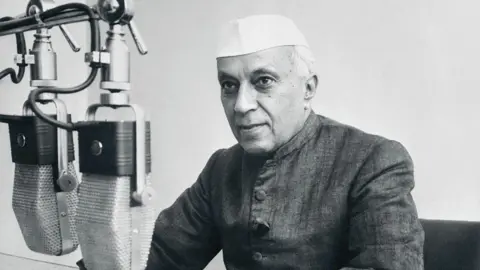
What is the National Herald?
The National Herald newspaper was founded in 1938 by Jawaharlal Nehru, India’s first prime minister and Rahul Gandhi’s great-grandfather.
It ceased publication in 2008 after running into financial troubles but was later acquired by the Congress in 2010 and relaunched as a digital news outlet in 2017.
It was published by Associated Journals Limited (AJL), which was established in 1937 with 5,000 freedom fighters as shareholders. AJL also published Qaumi Awaz in Urdu and Navjeevan in Hindi.
The National Herald became known for its association with India’s freedom struggle and its nationalist stance.
Nehru often wrote strong-worded columns, which led to the British government banning the paper in 1942. It reopened three years later.
After India gained independence in 1947, Nehru resigned as chairman of the newspaper to become prime minister.
But the Congress continued to play a huge role in shaping the newspaper’s ideology.
In a message to the National Herald on its silver jubilee in 1963, Nehru spoke about the paper “generally favouring Congress policy” while maintaining “an independent outlook”.
Over the years, the National Herald grew to be a leading English daily, supported by the Congress party, until it shut down in 2008 after years of financial troubles.
[BBC]
-

 News4 days ago
News4 days agoSuspect injured in police shooting hospitalised
-

 Features5 days ago
Features5 days agoRobbers and Wreckers
-

 Business4 days ago
Business4 days agoSanjiv Hulugalle appointed CEO and General Manager of Cinnamon Life at City of Dreams Sri Lanka
-

 Business5 days ago
Business5 days agoBhathiya Bulumulla – The Man I Knew
-

 Business6 days ago
Business6 days agoNational Anti-Corruption Action Plan launched with focus on economic recovery
-

 Features3 days ago
Features3 days agoLiberation Day tariffs chaos could cause permanent damage to US economy, amid global tensions
-

 Business3 days ago
Business3 days agoMembers’ Night of the Sri Lanka – Russia Business Council of The Ceylon Chamber of Commerce
-
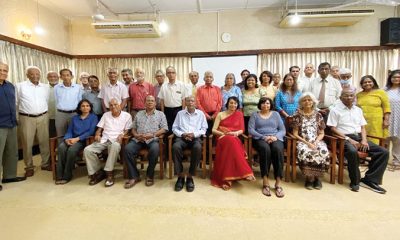
 Features3 days ago
Features3 days agoMinds and Memories picturing 65 years of Sri Lankan Politics and Society











